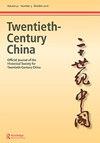Capital, Empire, Letter: Romanization in Late Qing China
IF 0.4
Q1 HISTORY
引用次数: 1
Abstract
Abstract:This article explores the history of the Roman alphabet in the late Qing empire (1637–1912). Following the opening of treaty ports to Western capital in the midnineteenth century, missionaries and diplomats who entered the Qing territories began to romanize various local languages. By the end of the nineteenth century, more than 20 languages had been romanized, which had an indelible impact on the politics of language and writing in China in the following decades. This article examines the origins of romanization in nineteenth-century China by situating it within a larger history of capitalism, imperialism, and the industrial printing press. Exploring the ideological and material dimensions of alphabetization, it contends that the Roman alphabet imposed a new epistemology of writing on China, which generated novel contradictions regarding language politics––contradictions that are still extant today.首都、帝国、字母:晚清中国的罗马化
摘要:本文探讨了晚清时期(1637-1912)罗马字母的历史。19世纪中期,随着对西方首都开放通商口岸,进入清朝领土的传教士和外交官开始将各种当地语言罗马化。到19世纪末,已有20多种语言被罗马化,这对中国随后几十年的语言政治和写作产生了不可磨灭的影响。本文通过将罗马化置于资本主义、帝国主义和工业印刷机的更大历史中,来考察19世纪中国罗马化的起源。在探索字母顺序的意识形态和物质维度时,它认为罗马字母表将一种新的写作认识论强加给了中国,这产生了关于语言政治的新矛盾——这些矛盾至今仍然存在。
本文章由计算机程序翻译,如有差异,请以英文原文为准。
求助全文
约1分钟内获得全文
求助全文

 求助内容:
求助内容: 应助结果提醒方式:
应助结果提醒方式:


